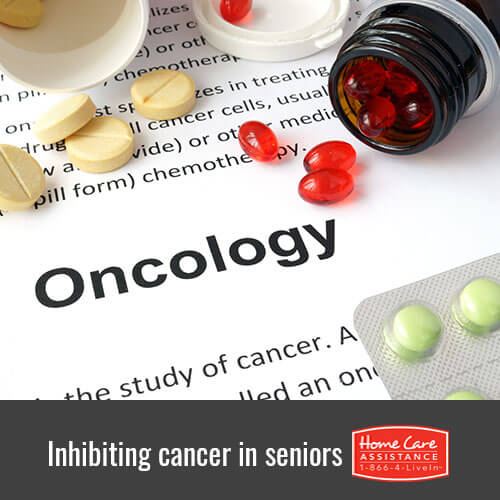It’s never too late to help your loved one walk down a healthier path and reduce his or her risk of cancer. The staff at Anchorage Home Care Assistance, a leading provider of senior home care, recommends these steps your loved one can take to help keep cancer away.
Stop Using Tobacco
Tobacco use is the number one preventable cause of cancer-related death in the United States. Seniors should be reminded it is never too late to quit tobacco, as kicking the habit yields immediate rewards like improved blood pressure, circulation, and lung function. A variety of safe, FDA-approved replacement medications such as nicotine gums, lozenges, and patches can help alleviate nicotine withdrawal symptoms and a counselor can help jumpstart a smoking cessation plan.
Eat Healthier
Recent research suggests digestive health is linked to immune system health, and up to 70 percent of the body’s immune system resides in the gastrointestinal tract, where organs at high risk for cancer reside, such as the stomach or pancreas. Meals rich in fruits, whole grains, or cruciferous vegetables like broccoli and cabbage promote digestive health. Seniors should also avoid artificial sweeteners like aspartame and sucralose, since they upset the fragile balance of a well-ordered digestive system.
Get Regular Exercise
Obesity may soon eclipse tobacco use as the leading preventable cause of cancer, but balanced nutrition and a regular exercise regimen can help seniors maintain optimal weight. Seniors who are overweight have more fat tissue, which can produce hormones associated with cancer growth, such as insulin or estrogen. Excess body fat can also increase cancer risk by affecting the immune system.
Limit Exposure to the Sun
A history of sun exposure and a less efficient immune system make older adults especially vulnerable to skin cancers. A water-resistant, broad-spectrum sunscreen with a sun protection factor (SPF) of 30 or higher protects against UVA and UVB radiation. Sun exposure during peak intensity hours—between 10am and 4pm should also be limited.
Any time is a good time to help your senior loved one embrace healthy lifestyle changes that can potentially reduce his or her risk of developing cancer. For some seniors, everyday tasks like grocery shopping and cooking have become more challenging and hinder their ability to make healthier decisions on a daily basis. Ensure your loved one has the support he or she needs to live a happy and healthy lifestyle with help from Home Care Assistance, a trusted provider of live-in and hourly care in Anchorage. We’re available 24/7 to answer your questions or further explain how our care services can promote a high quality of life for your loved one. Give us a call today at (907) 770-0907. We look forward to hearing from you.
